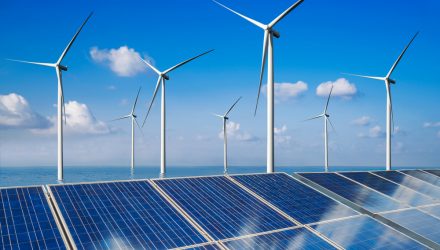German energy company RWE and Dutch-Norwegian company SolarDuck have announced a full-scale pilot of floating solar panels in the North Sea.
The floating solar parks in the North Sea are a technology that RWE is hoping to deploy globally and is a “new frontier for solar energy,” according to the press release. The floating solar pads will be incorporated into the space between existing offshore wind turbines, maximizing use of the ocean square footage that the wind farms currently take up.
The solar pads will allow for a dual method of capturing renewable energy, combining the energy harvested from wind alongside that obtained from the sun, creating a “more balanced production profile” for energy. RWE is the second-largest provider of offshore wind energy globally, with 18 farms currently established around the world and 10 gigawatts’ worth of renewable energy production currently being built.
“RWE is constantly looking for innovative ways to further improve the production of renewable energy offshore. We are very keen to further explore the potential of offshore floating solar together with our partner SolarDuck. For countries with lower mean wind speeds but high solar irradiation, this opens up attractive opportunities,” said Sven Utermöhlen, CEO of Wind Offshore at RWE Renewables, in the press release.
The solar technology was developed by SolarDuck and is built to withstand the strong winds, high waves, and corrosive elements of salt water; the pads are triangular and will float multiple feet above the surface of the water, moving with the waves “like a carpet.”
“We want to contribute to accelerate the energy transition, have a positive impact on marine ecology and help to integrate energy systems. Together we can make a real difference using tomorrow’s technology for today’s projects,” said Utermöhlen.
The project is being tested in the fairly unforgiving environment of the North Sea for durability, and if successful, it will be deployed in the bid that RWE is currently making for the offshore Dutch windfarm Hollandse Kust West.
Investing in RWE and the Net-Zero Transition
The KraneShares Global Carbon Transformation ETF (KGHG) focuses on the global industry leaders like RWE, which is carried at a 2.53% weighting within the fund, that are pushing the global transition to net-zero emissions. KraneShares believes that the upside potential of investing in these companies as they transition is enormous.
The fund seeks to capture the true potential within the carbon transition by focusing on companies from within industries that are traditionally some of the highest emission offenders but that are on the precipice of transitioning to renewable technologies. These companies that are set to disrupt their industries would benefit greatly from being leaders in the transition, as the cost of carbon emissions will only become more expensive, cutting into the bottom line as demand decreases for high emissions offenders.
KGHG is an actively managed fund that invests globally across market caps and sectors in carbon emissions reducers that are taking active steps to reduce their carbon footprints and services or the carbon footprints of other companies. This also includes companies within the supply chain of the carbon-reducing companies and companies that are growing their businesses with companies that are materially reducing carbon emissions.
The fund utilizes proprietary, fundamental, bottom-up analysis using information disclosed by companies and third-party data.
KGHG carries an expense ratio of 0.89%.
For more news, information, and strategy, visit the Climate Insights Channel.

